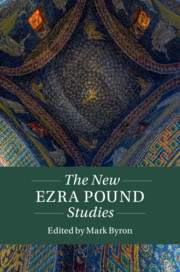Book contents
- The New Ezra Pound Studies
- Twenty-First-Century Critical Revisions
- The New Ezra Pound Studies
- Copyright page
- Contents
- Notes on Contributors
- Key to Abbreviations
- Editor’s Introduction
- Part I Pound’s Texts
- Chapter 1 Classical Literature
- Chapter 2 Early Medieval Philosophy and Textuality
- Chapter 3 Ezra Pound’s Pisan Cantos
- Chapter 4 ‘Scoured and Cleansed’
- Chapter 5 The Visual Field
- Chapter 6 Texts of The Cantos and Theories of Literature
- Chapter 7 Pound and Influence
- Part II Ezra Pound and Asia
- Part III Culture and Politics
- Index
- References
Chapter 1 - Classical Literature
from Part I - Pound’s Texts
Published online by Cambridge University Press: 17 October 2019
- The New Ezra Pound Studies
- Twenty-First-Century Critical Revisions
- The New Ezra Pound Studies
- Copyright page
- Contents
- Notes on Contributors
- Key to Abbreviations
- Editor’s Introduction
- Part I Pound’s Texts
- Chapter 1 Classical Literature
- Chapter 2 Early Medieval Philosophy and Textuality
- Chapter 3 Ezra Pound’s Pisan Cantos
- Chapter 4 ‘Scoured and Cleansed’
- Chapter 5 The Visual Field
- Chapter 6 Texts of The Cantos and Theories of Literature
- Chapter 7 Pound and Influence
- Part II Ezra Pound and Asia
- Part III Culture and Politics
- Index
- References
Summary
In a 1949 essay entitled ‘The Hellenists’, Ezra Pound argued that ‘a revival and a much greater diffusion of Greek studies is necessary to the conservation of decency’, a statement that expresses his decades-long argument for the wider distribution of classical literature as an engine of social transformation. The revival and circulation of classical languages and literatures preoccupied Pound, even as he expressed fluctuating levels of disdain for classics as an academic discipline. In turn, classics scholars have sometimes returned Pound’s animosity, as was seen most prominently when University of Chicago classicist W. G. Hale responded to Pound’s ‘Homage to Sextus Propertius’ by concluding that if he were a Latin professor, ‘there would be nothing left but suicide’.
- Type
- Chapter
- Information
- The New Ezra Pound Studies , pp. 9 - 25Publisher: Cambridge University PressPrint publication year: 2019

